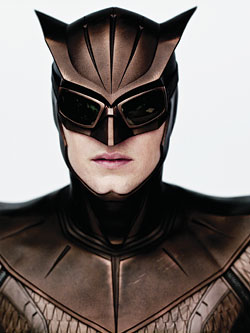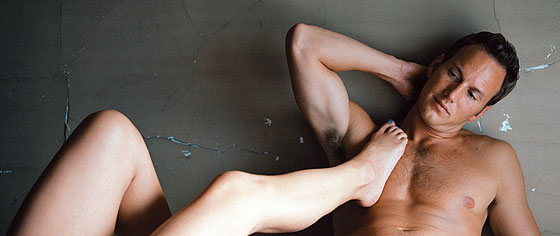
When actors talk about their big breaks, they tend to talk about the moments when they crossed the ephemeral line where obscurity morphs into ubiquity. Then you have the confounding exceptions, the cases like Patrick Wilson. The actor will be the first to explain (with no shortage of charm and self-deprecation) that his career has been an uninterrupted succession of big breaks—when his college pals were bartending, he was starring in a national tour of the musical Carousel, which landed him leads in The Full Monty and Oklahoma! on Broadway, which led to his Emmy-nominated role in Mike Nichols’s adaptation of Angels in America, which led to his stellar turn opposite Kate Winslet in Little Children. Yet to most of the public, he remains as obscure as he was when he moved to New York fourteen years ago. Doubly vexing is that Wilson, thanks in no small part to looking eerily like a young Paul Newman, has managed to date a handful of starlets at the apex of their notoriety (Jennifer Love Hewitt, Scarlett Johansson) without registering so much as a tremor on the Richter scale of tabloid obsession. “Most people outside the business, it’s safe to say, have no idea who I am,” he says. “If I ever get looks on the street, which, for the record, is almost never, it’s rarely because they think I’m someone they saw in a movie. More often someone sees me and thinks, Hey, was that guy my waiter the other night?”
This phase, Wilson was recently informed, will not last much longer. The prediction came not from a friend or an agent, who basically have to say such things, but from a stranger who approached Wilson wearing a makeshift costume of black body armor and chunky red, white, and blue shoulder pads. “He was dressed exactly like the Comedian,” says Wilson, referring to one of the central characters in Watchmen, the $120 million film adaptation of Alan Moore and Dave Gibbons’s celebrated and subversive 1986 graphic novel about downtrodden superheroes. Because Wilson stars, he was making the requisite appearance at the Comic-Con convention, where he was formally introduced to fanboys as the man who would be playing Dan Dreiberg, a.k.a. Nite Owl. After fulfilling his required duties (panel discussion, autograph-signing, photo ops), Wilson was hanging out with a friend when the Comedian clone approached. “He walks by and does a double take when he sees me,” Wilson recalls. “Then he says, ‘Enjoy it, man, because next year you’re not gonna be able to walk through here without being mobbed.’ ”
You’ll forgive Wilson if he has his doubts. While Watchmen is by far the most heavily promoted movie Wilson’s done—and probably the reason he’s now reluctant to reveal the precise neighborhood of his Brooklyn home—his track record with big-budget studio films has been a case study in near misses with mainstream recognition. Back in 2004, when he was cast as one of the leads in The Alamo, a quickly forgotten epic about Davy Crockett, he and his buddies had a running joke leading up to the day of the film’s release. “It was my first studio movie,” Wilson, 35, says, “and my friends and I were like, ‘Okay, it comes out on Friday, so Saturday you guys are gonna have to lock me up because I won’t be able to walk down the street.’ It was kind of a joke, obviously, but then when the movie came out and didn’t do too well … ” Wilson pauses for comedic effect. “Well, then it was really a joke, you know?”
That said, Wilson is aware that Watchmen is a different beast. Despite grim premonitions that digital piracy is destroying the movie industry, last year saw the highest box-office returns in Hollywood history—a record owing no small debt to the superhero movie, a genre that appears to be recessionproof: keeping studios in business with billion-dollar returns (The Dark Knight), turning arty directors into industry stalwarts (Christopher Nolan, Bryan Singer, Sam Raimi), reinventing the careers of wayward talent (Robert Downey Jr.), and pushing fringe actors into bona fide stardom (Tobey Maguire). When Jack Nicholson delivered his masterly Joker twenty years ago, an Oscar was never mentioned; last week, the late Heath Ledger won an Academy Award for the same part.
“Something’s definitely changed,” acknowledges Wilson, who recently finished a run on Broadway opposite Katie Holmes in Arthur Miller’s All My Sons. “But I don’t think the attitude is as new as people make it out to be. Yes, there used to be more of a stigma to tights roles, but studios have always gravitated toward unexpected actors. When Christopher Reeve did Superman, he was a serious stage actor, and when Michael Keaton played Batman, he was doing some of the most varied roles of anyone onscreen.”

Watchmen, however, presents challenges far greater than wearing tights. It is, without question, the weirdest, most cerebral, and unconventional take on the genre to date—essentially a deconstruction of the entire idea of superheroes. Set in a dystopic iteration of eighties New York (Nixon is in his fifth term and the world teeters on the brink of all-out nuclear war), the Watchmen of the title are six masked avengers who, aside from Dr. Manhattan, have no real powers in the X-Men sense; they’re just people in costumes who kick butt. Forced into early retirement by the government, they spend more time questioning their purpose in life than saving the lives of innocent people. And with no clear villain until the final minutes of the movie, the story sidesteps the question that propels even the most artful of comic-book movies (will good prevail over evil?) in favor of a morally ambiguous dilemma (can a little evil do a lot of good?). Along the way, there are plenty of gaudy action sequences, of course, but the entertainment comes less from watching buildings blow up than from learning how the people feel about what they’re doing.
Deborah Snyder, one of the film’s producers, says she and her husband, Watchmen director Zack Snyder (300), went after Wilson for his deft ability to convey that inner angst. “He was the first person we cast,” she says. “He’s incredibly handsome, obviously. But it was really what he did with Little Children—that accessibility, which is a rare quality in Hollywood—that let us know he was right.”
To allow his character’s existential fog to take precedence over those matinee-idol looks, Wilson packed on 25 pounds, seemingly all in his gut (he is, after all, a retired superhero gone to seed). It was a bold move given his long and awesomely stylized sex scene with Silk Spectre II (Malin Akerman). “I saw the movie for the first time a week ago,” says Wilson. “I watched it with my wife”—the actress Dagmara Dominczyk—“and after that scene, she congratulated me. That never happens, let me tell you. When she saw Little Children”—in which his character spends every third scene having sex—“she understood that it was necessary, but it was also a little weird. With Watchmen, she told me she was just pulling so hard for the characters that when they got together—even though it was me and another woman—she was excited.” He laughs. “After that, I was pretty confident that I ended up doing something right with this one.”

• Making the Watchmen’s New York
• Notable Comic-Book Locations
• New York’s Finest Graphic Novels
• Alex Robinson’s Comic-Life Highlights
• Movie Review: Watchmen